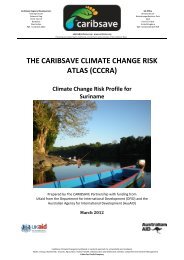Create successful ePaper yourself
Turn your PDF publications into a flip-book with our unique Google optimized e-Paper software.
5.4. Human Health<br />
5.4.1. Policy<br />
The Public <strong>and</strong> Environmental Health Ordinance is the main legislation that governs health care through<br />
maintenance of environmental quality which includes water resources, the l<strong>and</strong> <strong>and</strong> the air, housing quality<br />
<strong>and</strong> food safety. The Water <strong>and</strong> Sewer Ordinance addresses sewerage disposal but the Government of<br />
<strong>Turks</strong> <strong>and</strong> <strong>Caicos</strong> (2003) recommended that penalties be implemented to reduce pollution of water bodies<br />
that target the individual, businesses <strong>and</strong> international shipping agencies. It also highlighted the need for<br />
more explicit regulations to deal with sewage disposal. The Strategic Health Plan 2006-2010 in <strong>Turks</strong> <strong>and</strong><br />
<strong>Caicos</strong> Isl<strong>and</strong>s was one of seven key documents devised to develop the socio-economic framework of the<br />
government. The Strategy for Action to Implement the Environment Charter of the <strong>Turks</strong> <strong>and</strong> <strong>Caicos</strong>, in<br />
addressing areas of environmental concern also addressed some issues related to climate change <strong>and</strong><br />
variability. These included invasive species <strong>and</strong> port environmental security, mosquito control,<br />
establishment of policies to address poverty <strong>and</strong> unemployment <strong>and</strong> addressing illegal immigration <strong>and</strong><br />
subst<strong>and</strong>ard housing (Government of <strong>Turks</strong> <strong>and</strong> <strong>Caicos</strong> Isl<strong>and</strong>s, 2003).<br />
The National Socio-economic Development Framework (NSEDF) 2008-2017 is the most current document<br />
mapping the development of social concerns in the territory. The expenditure for the period 2008 to 2017<br />
for social services has been estimated at US $1,210,176,484 or 60.23% of the programme budget which<br />
includes other areas such as infrastructure, information <strong>and</strong> communication technology, national security<br />
<strong>and</strong> environmental management. For health programmes specifically, the estimated budget is 67% of the<br />
social services allocation, or 40% of the entire NSEDF budget (Kairi Consultants Limited, 2008). These<br />
expected investments do not include expenditure related upgrading the health care system <strong>and</strong> the<br />
provision of affordable housing. The framework makes provisions for the development of an Integrated<br />
Health Information System with an estimated cost of US $872,000 <strong>and</strong> for Health Institutional Capacity<br />
Building at a cost of US $3,774,300. It also outlines other projects under the health sector which include<br />
(Kairi Consultants Limited, 2008):<br />
“Establishment of an effective system for rapid airlift of patients to secondary <strong>and</strong> tertiary health<br />
care facilities<br />
Preparation of Health Disaster Policy <strong>and</strong> Management Plans<br />
Modification of anti-poverty strategies with the findings of the NALC <strong>and</strong> socio-economic conditions<br />
within the country”.<br />
Under other subsections other provisions were made, for example Flood Alleviation <strong>and</strong> Drainage<br />
Improvement programme which is a project under Infrastructural Projects <strong>and</strong> would help alleviate<br />
flooding <strong>and</strong> as a result reduce the risk of vector borne diseases <strong>and</strong> diseases likely to be spread by rodents.<br />
The Integrated Sustainable Waste Management System (ISWMS) <strong>and</strong> IWCM are also important in disease<br />
prevention <strong>and</strong> control. Finally, the NSEDF identified climate change as a priority area <strong>and</strong> addressed the<br />
need for a Climate Change Adaptation Policy <strong>and</strong> Action Plan for the <strong>Turks</strong> <strong>and</strong> <strong>Caicos</strong> Isl<strong>and</strong>s which was<br />
expected to commence in 2008, but it did not give a sectoral breakdown of the intended objectives of this<br />
policy <strong>and</strong> action plan (Kairi Consultants Limited, 2008).<br />
In terms of initiatives specifically addressing climate change <strong>and</strong> the health sector, the <strong>Turks</strong> <strong>and</strong> <strong>Caicos</strong><br />
Isl<strong>and</strong>s Climate Change Green Paper identified a number of adaption strategies relevant to the health<br />
sector which are as follows:<br />
121





